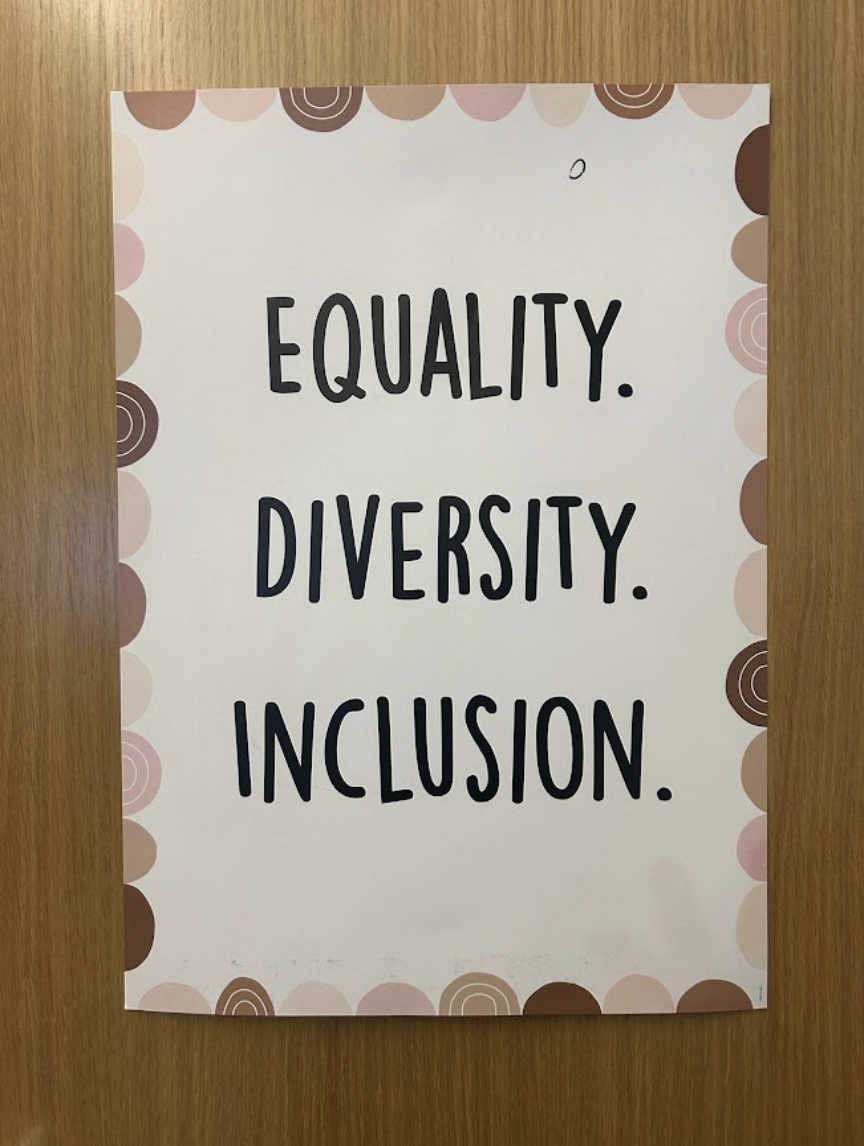
Picture above shows a poster found in Ms. Levy's (10th grade Government and Economics and 7th grade I&S) classroom
As I look to my right in the Government and Economics classroom, I see the words “Equality. Diversity. Inclusion.” Three words that have been integrated into our school lives at Clinton. However, as our country enters a new administration, these principles are being threatened, challenging our country’s progress to create a more inclusive society.
Soon after being sworn into office, President Trump issued several executive orders intending to eradicate DEI, one of which, titled “Ending Radical And Wasteful Government DEI Programs And Preferring” claims that “Americans deserve a government committed to serving every person with equal dignity and respect, and to expending precious taxpayer resources only on making America great.” The irony of this statement, however, is that President Trump claims that every person should be treated with equal dignity and respect. Yet to achieve true equality and dignity, you cannot dismantle the very initiatives aimed at addressing the systemic barriers that have constrained people from receiving the same opportunities as others who experience economic and societal advantages.
Diversity, Equity, and Inclusion (DEI) is a group of programs previously backed by the U.S. government that addresses discriminatory practices by increasing workplace diversity, diminishing the gender pay gap, and creating more flexible work hours. However, the official White House website, now under the Trump Administration, states that “The Biden Administration forced illegal and immoral discrimination programs, going by the name “diversity, equity, and inclusion” (DEI), into virtually all aspects of the Federal Government, in areas ranging from airline safety to the military”.
According to the Health and Human Rights Journal at Harvard University, Trump has a banned word list including words like “gender, transgender, pregnant person”. These words are not allowed to be in on the US Centers for Disease Control’s website. These words describe so many identities, yet he wants us to erase them, especially transgender people. Fair and just treatment of people in the LGBTQ+ community is something that DEI programs have fought so hard for, and by getting rid of it, we would be getting rid of decades of development. Instead of looking toward the future, it feels as if we are turned around, headed toward our past.
Many who identify as right-wing believe that anti-discrimination policies are indeed discriminatory towards groups that have historically received more opportunities. However, these people are often unaware of what DEI really does and what it means, with many right-wing people saying DEI stands for “Didn’t Earn It”. The conservative population of America often believes DEI creates an imbalance in opportunities when in reality, its entire point is to create more equitable and just circumstances. One 10th grader at Clinton, Alice Hollinger, feels strongly that “DEI is not an advantage” and it exists in order to “bridge the gap between the opportunities that exist for rich people and less fortunate people.” By eliminating DEI policies, we are strengthening the systemic barriers that keep minorities at a disadvantage, making it easier for only the privileged to gain positions of power.
However, DEI didn’t start in 2020. It has been a pillar of America, with the Black community fighting to end racial segregation and the suffragettes fighting for their right to vote. On January 22, at 5 PM, all federal DEI hires were removed from their jobs. This has caused distress within our government, with many necessary positions not being filled. Inside Higher Ed stated that the Education Department has put “employees in charge of DEI programs on paid leave and canceling more than $2.6 million in training and service contracts.”
Abolishing DEI policies within schools will cause changes and restrictions on curriculums, learning environments, or even what students can speak about in class. In our school, our teachers do well in educating us about the importance of frameworks such as these. However, for a future inclusive society, we need students with open minds who are exposed to topics many in our country are unaware of, or poorly educated about, such as DEI, or critical race theory.